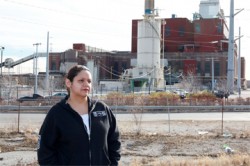By: Ashmar Mandou

Kimberly Wasserman helped lead local residents in a successful campaign to shut down two of the country’s oldest coal power plants—and is now transforming Chicago’s old industrial sites into multi-use spaces. On Monday, Wasserman received the prestigious Goldman Environmental Prize for her efforts in closing the Fisk and Crawford Power-Plants.
 Chicana born and raised in Little Village, Wasserman developed a keen sense for community activism at a very young age, a quality she attributes to her parents. “I had two great parents who always instilled in me this sense of community. This sense of community leadership,” said Wasserman, who led her first campaign in the sixth grade. In 1998, Wasserman’s life changed dramatically when her son experienced his first asthma attack at 2-months old. “I couldn’t figure out why it happened. No one in my family had asthma, so it wasn’t hereditary.” The traumatic episode prompted Wasserman to pursue studies that showed high incidences of asthma attacks in Mexican-Americans, but could not come across any. “It was then I realized that only Mexican-Americans in my community, children, adults, seniors…I saw high incidences of asthma-related cases in my community. That’s when I knew the Fisk and Crawford plants had a direct impact on the health of many residents living in Little Village and Pilsen.”
Chicana born and raised in Little Village, Wasserman developed a keen sense for community activism at a very young age, a quality she attributes to her parents. “I had two great parents who always instilled in me this sense of community. This sense of community leadership,” said Wasserman, who led her first campaign in the sixth grade. In 1998, Wasserman’s life changed dramatically when her son experienced his first asthma attack at 2-months old. “I couldn’t figure out why it happened. No one in my family had asthma, so it wasn’t hereditary.” The traumatic episode prompted Wasserman to pursue studies that showed high incidences of asthma attacks in Mexican-Americans, but could not come across any. “It was then I realized that only Mexican-Americans in my community, children, adults, seniors…I saw high incidences of asthma-related cases in my community. That’s when I knew the Fisk and Crawford plants had a direct impact on the health of many residents living in Little Village and Pilsen.”
A Harvard study, which was shared by LVEJO, revealed that the coal-power plants contributed to more than 40 premature deaths, 550 emergency room visits and 2,800 asthma attacks, affecting mostly children living close to the vicinity.
Angered by this, Wasserman led a door-to-door campaign and spoke to families in her neighborhood who were dealing with similar issues. With the help of LVEJO and other community-based organizations, Wasserman got residents to organize pickets, hold public hearings, host “Toxic Tours” of industrial sites and stage a “Coal Olympics” timed around the Chicago’s bid to host the 2016 Olympic Games. In 2011, the city created the Chicago Clean Power Coalition, which helped build momentum for Wasserman’s campaign to shut down the Fisk and Crawford Plants. “Once public officials were on board and the voice of the community grew louder, we knew something had to be done.”
As a result of her tenacity and unyielding attitude for positive change, Wasserman received the prestigious Goldman Environmental Prize for North America on Monday evening. The Goldman Environmental Prize supports individuals struggling to win environmental victories and inspire others to take extraordinary measures to protect the world. The Goldman Environmental Prize was created in 1989 by civic leaders and philanthropists Richard N. Goldman and his wife, Rhoda H. Goldman.
“I don’t want to say that receiving the Goldman Prize validates the hard work we did as a community because the closure of the coal-power plants is really what did that,” said Wasserman. “But the award demonstrates that if we come together as a community, anything is possible. That there is not just local value to the work that we do, but that people definitely are paying attention and watching the story around the world.” Wasserman shared with us some of her thoughts on the closure of the plants, why community activism is everyone’s responsibility, and what she hopes to see take the place of the Fisk and Crawford plants.
Closing Fisk and Crawford
It was amazing to get that phone call when somebody tells you that the plants have agreed to shut down. The announcement was well-received and I think it just really brought a sense of empowerment, not just for me, but for the community and it kind of showed what happens when we come together and fight together, no matter how long it takes. It left our community feeling like anything is possible.
New Future
Pulaski is one of the entry points into our community. I think what we really want to see is something that encompasses retail, like manufactory. An industry that is not harmful to our community, but actually an asset to our community. Also, we want to see green space that gives us access to see the river. We want something that sets the tone of what our community is really about. We want a site that encompasses the culture of our community.
Fight Continues
Now that the power plants have shut down, we have to focus on remediation and redevelopment. Our fight is not over. There are still many issues we need to address. We need to continue fighting for proper access to the 31st bus route and the 25-acre park. We need to put pressure on our public officials to insure that our residents have the things they need.
Community Activism
Activism is important because no one is going to do it for us. I think a lot of times we just sit back and we have no problem complaining and pointing fingers [laughed]. But it takes someone special to sit up and make a change. In reality we can’t just count on one person to make the change we want to the community, we have to do that for ourselves. We have to step up and do our part. Don’t be afraid to share your voice because other people will follow suit. Twelve years is a long time to campaign for a cause, but we never stopped, we never tired, we knew we had to do it for our community.











